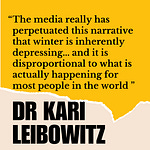Mental health, climate science, ethnicity, LGBTQ, disability, inequality, gender, women, elderly make up just 10 of the 200 terms now banned from research with US government funding. And this is not just in the US, but in other countries that receive US funding.
The National Institute of Health, which funds billions of dollars of medical research, has already pulled funding from hundreds of grants, including projects on discrimination in healthcare and LGBTQ+ teen health.
Diversity, equity, and inclusion programs have also been terminated – several companies have dropped diversity targets and scholarships to support people from marginalised communities have been cancelled.
This isn’t just about limiting what science can study - it is about who gets to do the science in the first place. We spoke to Professor Christina Pagel, a Professor of Operational Research at University College London, and the author of a new report How Diversity Makes Science Better to understand the full impact of these restrictions and why diversity is important in science.
Christina's 3-page report, How Diversity Makes Science Better, published with Independent SAGE can be found here.















Share this post